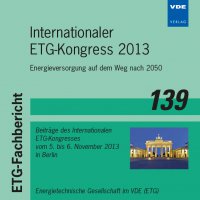Optimal Allocation and Capacity of Renewable Energies, Storage Systems and Transmission Grid in the Future European Power System
Konferenz: Internationaler ETG-Kongress 2013 – Energieversorgung auf dem Weg nach 2050 - Symposium 1: Security in Critical Infrastructures Today
05.11.2013 - 06.11.2013 in Berlin, Deutschland
Tagungsband: Internationaler ETG-Kongress 2013 – Energieversorgung auf dem Weg nach 2050
Seiten: 6Sprache: EnglischTyp: PDF
Persönliche VDE-Mitglieder erhalten auf diesen Artikel 10% Rabatt
Autoren:
Alvarez, Civil Ricardo; Chen, Hengsi; Moser, Albert (IAEW RWTH Aachen University, Germany)
Thien, Tjark; Moos, Melchior; Cai, Zhuang; Leuthold, Matthias; Sauer, Uwe (PGS E.ON ERC, RWTH Aachen University, Germany)
Inhalt:
The reduction of the greenhouse gas emission to 80-95% below 1990 levels by 2050 adopted by the European Commission in the “Energy Roadmap 2050” brings the need of assessing and evaluating different options to achieve that goal. Among them, one major challenge is to transform the current European Power System towards a one with a higher share of renewable energies. As a consequence, questions like optimal allocation and capacity of renewable energy sources (RES) and storage systems in Europe, as well as the transmission grid between European regions naturally arises. In order to approach those questions, an optimization tool called Genesys (Genetic Optimization of a European Energy System) was developed. Genesys optimizes the capacity and allocation of RES, the storage system and transmission network in order to get minimal overall economic costs. Exemplary results for the EUMENA Region (Europe, Middle East and North Africa) for the year 2050 show an optimal installed capacity of RES of 5,261 GW, a HVDC overlay grid between the regions of 1,318,268 GWkm, and a storage capacity of 756 TWh. Such a system would lead to total generation costs of 8.06 ct/kWh. The development of Genesys was promoted by the Federal Ministry for the Environment, Nature Conservation and Nuclear Safety (BMU), within the project code FKZ: 0325366.


